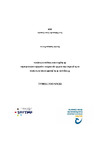Identificador persistente para citar o vincular este elemento:
https://accedacris.ulpgc.es/jspui/handle/10553/105764
| Título: | El impacto de la planificación de la tarea en la producción oral de aprendices españoles universitarios de inglés como lengua extranjera | Autores/as: | Santana Perera, Beatriz | Director/a : | Arnáiz Castro, Patricia | Clasificación UNESCO: | 5701 Lingüística aplicada 570111 Enseñanza de lenguas |
Fecha de publicación: | 2020 | Resumen: | The objective of this study was twofold. On the one hand, it aimed at investigating the effects of three different planning conditions on the complexity, accuracy, lexis and fluency of Spanish university EFL learners’ oral production, and on the other hand, the strategies that the participants used to plan the different tasks and their perceptions on their performance. Forty core participants engaged in three same-type tasks involving individual oral performance under strategic planning conditions, individual oral performance under careful online planning conditions, and individual oral performance under collaborative planning conditions. For the last one, twenty core participants planned the task with twenty non-core participants of the same proficiency level (B1), and the remaining twenty core participants planned the task with other non-core participants with higher proficiency level (B2). The oral productions of all core participants were measured along specific measures for the three dimensions of complexity, accuracy and fluency (CAF) – since CAF has been mainly figured as the primary foci of most studies –, but also along, lexis (particularly lexical sophistication), ameasure which has been absent in the majority of the studies conducted to date, despite representing a form of complexity that ought to be assessed in foreign language oral performance as an independent variable. After completion of the task, the core participants were asked to complete a post-hoc questionnaire that helped us know whether they had focused either on form or on meaning while planning the tasks as well as obtain feedback on their perceptions about the tasks and their performance, and the strategies they used to plan the different tasks. The findings suggested that there is a trade-off effect between the three different planning conditions, being the strategic dyadic planning in general the condition that led to the most optimal speech in terms of syntactic complexity, grammar accuracy, lexical sophistication, and fluency in comparison with the speech that they produced individually, both under strategic planning conditions, and under careful online planning conditions. They also showed that the accuracy of the Spanish university EFL learners improves when the planning peers have mixed proficiency level. The participants’ post-hoc questionnaires responses supported these findings given that the majority of the core participants reported to have found the last task, i.e. the interactive, the easiest to perform. Also they reported to have used a wider range of strategies, focused both on the meaning and on the form, when planning the third task. The findings suggest, therefore, that pairing learners, either with the same or with different proficiency levels in the EFL classroom may have positive learning effects provided that they followed a collaborative pattern. | Descripción: | Programa de Doctorado en Estudios Lingüísticos y Literarios en sus Contextos Socioculturales por la Universidad de Las Palmas de Gran Canaria | URI: | https://accedacris.ulpgc.es/handle/10553/105764 |
| Colección: | Tesis doctoral |
Visitas 5
160
actualizado el 10-ene-2026
Descargas
158
actualizado el 10-ene-2026
Google ScholarTM
Verifica
Comparte
Exporta metadatos
Los elementos en ULPGC accedaCRIS están protegidos por derechos de autor con todos los derechos reservados, a menos que se indique lo contrario.
